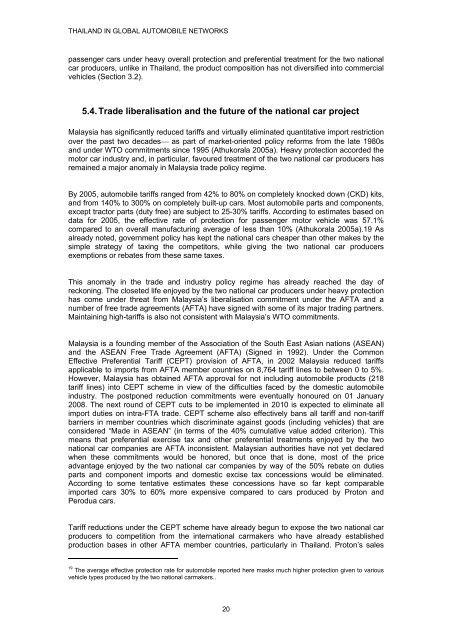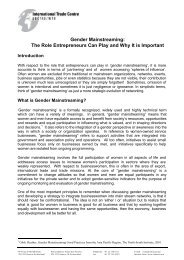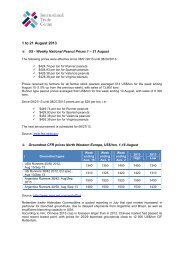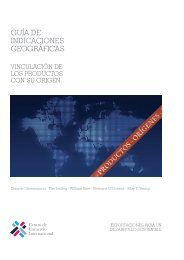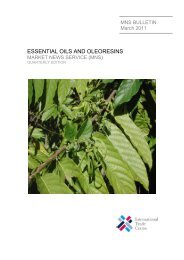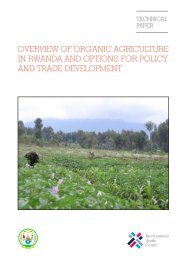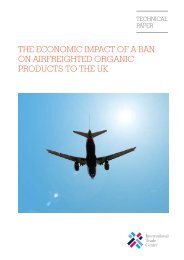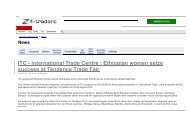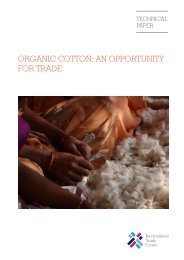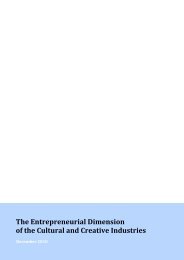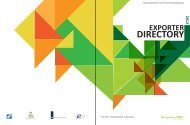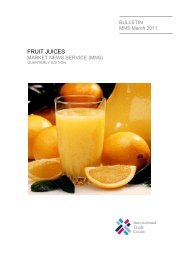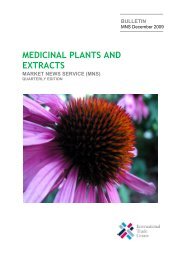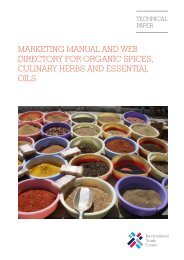thailand in global automobile networks - International Trade Centre
thailand in global automobile networks - International Trade Centre
thailand in global automobile networks - International Trade Centre
You also want an ePaper? Increase the reach of your titles
YUMPU automatically turns print PDFs into web optimized ePapers that Google loves.
THAILAND IN GLOBAL AUTOMOBILE NETWORKS<br />
passenger cars under heavy overall protection and preferential treatment for the two national<br />
car producers, unlike <strong>in</strong> Thailand, the product composition has not diversified <strong>in</strong>to commercial<br />
vehicles (Section 3.2).<br />
5.4. <strong>Trade</strong> liberalisation and the future of the national car project<br />
Malaysia has significantly reduced tariffs and virtually elim<strong>in</strong>ated quantitative import restriction<br />
over the past two decades⎯ as part of market-oriented policy reforms from the late 1980s<br />
and under WTO commitments s<strong>in</strong>ce 1995 (Athukorala 2005a). Heavy protection accorded the<br />
motor car <strong>in</strong>dustry and, <strong>in</strong> particular, favoured treatment of the two national car producers has<br />
rema<strong>in</strong>ed a major anomaly <strong>in</strong> Malaysia trade policy regime.<br />
By 2005, <strong>automobile</strong> tariffs ranged from 42% to 80% on completely knocked down (CKD) kits,<br />
and from 140% to 300% on completely built-up cars. Most <strong>automobile</strong> parts and components,<br />
except tractor parts (duty free) are subject to 25-30% tariffs. Accord<strong>in</strong>g to estimates based on<br />
data for 2005, the effective rate of protection for passenger motor vehicle was 57.1%<br />
compared to an overall manufactur<strong>in</strong>g average of less than 10% (Athukorala 2005a).19 As<br />
already noted, government policy has kept the national cars cheaper than other makes by the<br />
simple strategy of tax<strong>in</strong>g the competitors, while giv<strong>in</strong>g the two national car producers<br />
exemptions or rebates from these same taxes.<br />
This anomaly <strong>in</strong> the trade and <strong>in</strong>dustry policy regime has already reached the day of<br />
reckon<strong>in</strong>g. The closeted life enjoyed by the two national car producers under heavy protection<br />
has come under threat from Malaysia’s liberalisation commitment under the AFTA and a<br />
number of free trade agreements (AFTA) have signed with some of its major trad<strong>in</strong>g partners.<br />
Ma<strong>in</strong>ta<strong>in</strong><strong>in</strong>g high-tariffs is also not consistent with Malaysia’s WTO commitments.<br />
Malaysia is a found<strong>in</strong>g member of the Association of the South East Asian nations (ASEAN)<br />
and the ASEAN Free <strong>Trade</strong> Agreement (AFTA) (Signed <strong>in</strong> 1992). Under the Common<br />
Effective Preferential Tariff (CEPT) provision of AFTA, <strong>in</strong> 2002 Malaysia reduced tariffs<br />
applicable to imports from AFTA member countries on 8,764 tariff l<strong>in</strong>es to between 0 to 5%.<br />
However, Malaysia has obta<strong>in</strong>ed AFTA approval for not <strong>in</strong>clud<strong>in</strong>g <strong>automobile</strong> products (218<br />
tariff l<strong>in</strong>es) <strong>in</strong>to CEPT scheme <strong>in</strong> view of the difficulties faced by the domestic <strong>automobile</strong><br />
<strong>in</strong>dustry. The postponed reduction commitments were eventually honoured on 01 January<br />
2008. The next round of CEPT cuts to be implemented <strong>in</strong> 2010 is expected to elim<strong>in</strong>ate all<br />
import duties on <strong>in</strong>tra-FTA trade. CEPT scheme also effectively bans all tariff and non-tariff<br />
barriers <strong>in</strong> member countries which discrim<strong>in</strong>ate aga<strong>in</strong>st goods (<strong>in</strong>clud<strong>in</strong>g vehicles) that are<br />
considered “Made <strong>in</strong> ASEAN” (<strong>in</strong> terms of the 40% cumulative value added criterion). This<br />
means that preferential exercise tax and other preferential treatments enjoyed by the two<br />
national car companies are AFTA <strong>in</strong>consistent. Malaysian authorities have not yet declared<br />
when these commitments would be honored, but once that is done, most of the price<br />
advantage enjoyed by the two national car companies by way of the 50% rebate on duties<br />
parts and component imports and domestic excise tax concessions would be elim<strong>in</strong>ated.<br />
Accord<strong>in</strong>g to some tentative estimates these concessions have so far kept comparable<br />
imported cars 30% to 60% more expensive compared to cars produced by Proton and<br />
Perodua cars.<br />
Tariff reductions under the CEPT scheme have already begun to expose the two national car<br />
producers to competition from the <strong>in</strong>ternational carmakers who have already established<br />
production bases <strong>in</strong> other AFTA member countries, particularly <strong>in</strong> Thailand. Proton’s sales<br />
19 The average effective protection rate for <strong>automobile</strong> reported here masks much higher protection given to various<br />
vehicle types produced by the two national carmakers..<br />
20


